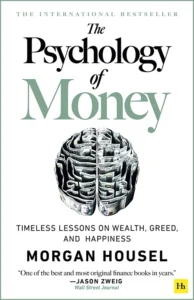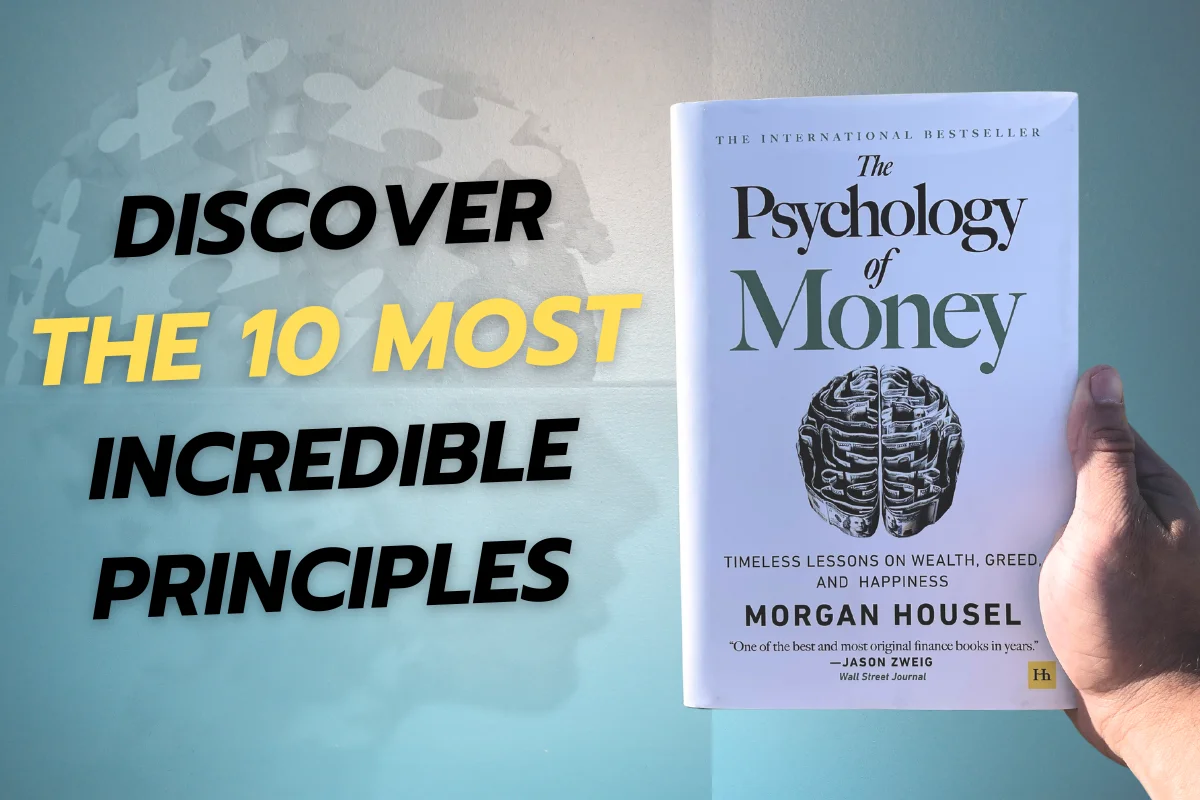It was a rainy Sunday morning. Autumn had set in and I did not feel like going out. Instead, I picked up the book that had been waiting for me to read for a long time. I had wanted to read it many years ago, but somehow I never got around to it. What a mistake!
The Psychology of Money is a page-turner, believe it or not. At least for me. I finished the book in one (long) day. And I learned a lot. The book consists of 20 short chapters on the psychology of money. In many cases, each chapter begins with a catchy story from which an important financial lesson can be learned. Very valuable!

Because the book really inspired me, I want to share the 10 best principles with you. If these resonate with you, consider buying a copy of the book. You will not be disappointed.
The 10 best principles that the Psychology of Money has to offer
As I said before, this book is absolutely jam-packed with awesome learning! So, I’m excited to share my top 10 principles I took away from the book.
1. You’re not rational
People often think they’re making very conscious decisions, that they are being rational. Most of the time they are not. Especially when it comes to money. There is a lot of subconscious emotion involved with money. The author argues that this is why you should not choose the investment strategy with the highest return, but one that you enjoy, feel comfortable with, and can stick with over time. For some people, this is stock picking. For others, it is investing in a well-diversified index like the S&P500.
This chapter made me realize that I am not always rational when it comes to money. And that being rational is not something I should strive for. It’s much more important to strive to be reasonable. For example, I enjoy analyzing companies and doing stock picking with part of my portfolio. The fact that this gives me a small chance of beating the S&P500 index over the long term is something that I take for granted. What is more important is that I enjoy doing it, learn from it, and continue to invest a fixed amount each month because of it.
2. Respect and admiration come from the little things
We all love to buy nice things to show the world how much we care. Cars, clothes, watches. The list goes on and on. We all can be a little bit silly sometimes. The writer gave a great example. Just picture a man in a $300.000 Ferrari! People always look when he drives by. The man feels like a success and is admired by everyone who looks at him. But here’s the thing: who is really paying attention to him? Everyone looks at the car and imagines themselves in that car.
Take a moment to think about yourself. When you see an expensive car, how often do you find yourself looking at the driver? And would you be able to recognize this wonderful person the next day if he was walking instead of driving his expensive car?
The main thing to take away from this chapter is that if you’re looking for respect and admiration, it’s not going to come from material things. It’s the little things, like being humble, kind, and empathetic. Those will earn you much more respect and admiration than a whole fleet of expensive cars.
3. Focus on friendship and experiences
We haven’t even gotten to the end of our Ferrari conversation yet! There’s a big difference between being “rich” and being “wealthy.” Wealth is something you can see, like someone driving an expensive Ferrari. It’s pretty easy to spot rich people. But being wealthy is invisible and exactly what you don’t see. In fact, wealth is income that has not been spent, but has been saved for later.
Wealth gives you so many options and flexibility and the chance to grow and flourish in the future. All you can say when you see someone driving a 300k Ferrari is that he has €300,000 less money in the bank than before he bought that car. It’s a shame, but it’s true! It’s so easy to get carried away with expensive things. More often than you think, people with expensive things live beyond their means and end up in financial trouble later in life. Gone is their freedom. Do you want to be rich or wealthy?
This chapter taught me two things. First, I learned not to judge people’s success too quickly. Being rich doesn’t necessarily reflect how happy and wealthy people are. Second, I learned that I shouldn’t focus too much on wealth. From now on I will focus much more on experiences, friendships, and relationships.
4. No one is crazy
Your perspective on the world is shaped by your personal experiences, and that’s totally normal! It’s not that people’s choices are crazy, it’s just that they might not make sense to someone else.
5. Luck and risk go hand in hand
Just a friendly word of advice: be careful which people you praise and who you look down on. It’s so true that success and failure are often just a thin line apart, and a lot of it depends on chance, especially when there’s risk involved.
6. It’s ever enough
We all have our limits, and it’s only natural to compare ourselves to those around us. So, you always want to do more, and you don’t always enjoy the journey to get there? Think twice, it’s so easy to forget how far you’ve already come!
7. Getting rich isn’t staying rich
You must maintain your financial discipline. Investing is not only about making good decisions. It’s also about avoiding financial stupidity.
8. Unlikely outcomes have impact
A small number of events often have a gigantic impact on the overall result. It’s amazing how a few stocks in a portfolio can make a huge difference in the overall result!
9. Freedom is valuable
One of the most valuable aspects of money is the ability to control your time. This could mean choosing a job that you like, taking a vacation, or even working part-time.
10. Save space for mistakes
It is important to accept that there are often unforeseen circumstances that do not align with our expectations, such as stocks in your portfolio that may not perform as anticipated. Take a step back and view the situation in its entirety. Identify the key takeaway, and then move forward.
My final thoughts
Hope you liked reading these 10 principles. I really think everyone should read this book if they want to understand the psychology behind money better. After all, handling money well is not necessarily about what you know. It’s about how you think and behave. It taught me so much about the emotional side of money. This book is a breeze to read and perfect for anyone new to the world of finance. You’ve got to read this book! You’ll be thrilled when you see how many times the purchase price pays for itself!

Leave a Reply